11:30 pm at night is not when one would expect to see a conference hall packed to its fullest, the audience and panelists in keen interaction, discussion and debate….
But then, that’s the beauty about the Indian Animation, VFX & Gaming Industry which is full of dynamism, passion and drive…. for whom the clock doesn’t stop ticking. An industry that believes that the time for knowledge sharing and growth is Now! So what if the Now! can go on till as late as 11.30 pm at night!!!
Extremely well attended and participated by Industry professionals (150 +) AnimationXpress.com’s AITF (Animation & Interactive Technology Forum) presented by Intel was succesfull in creating a knowledge sharing and networking platform on the subject of technology for the Industry. Except for the conference span being elongated by a couple of hours and a couple of *technical* glitches, the AITF drew a lot of appreciation by one and all that attended, everyone commented that the choice of topics and speakers was very pertinent and relevant, that the panelists and speakers did some great presentations and there was great demand to have the conference on a frequent basis.
What AITF did, was bring together professionals and stakeholders from across a broad spectrum to discuss technology challenges and issues; what it had was the support of some excellent speakers who shared generously from their experience; what AITF also did was to honor and acknowledge the tremendous and outstanding conribution of technology professionals through the AnimationXpress.com Technology Wheel of Honor…. â€?
What AITF needs to do in its future conferences is to sharpen and fine tune its technology focus even further…. it has to become a forum where issues are not just discussed but where solutions are found……and AITF is also going to be online on AnimationXpress.com as a forum, as a knowledge base
While every session was a highlight in itself, the panel discussion was a big hit with the audience. The panel sported a range of speakers including MEL production consultant Jai Natarajan, Anibrain Director Jesh Krishna Murthy, DuxSoft CTO Krishna Prasad, Director of SMG Group Intel Technology India Pvt Ltd Rajesh Gupta, FX Graphics Proprietor Vivek Malhotra and AnimationXpress.com Co Founder Anand Gurnani. The audience appreciated the pragmatic and �to the point� insights shared by the panelists as well as the interactive quotient of it.
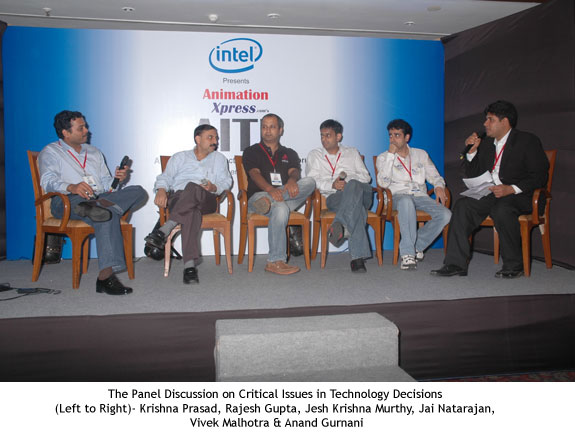
(AnimationXpress.com will carry a session wise knowledge base of the AITF conference (in collaboration with the presenters and speakers) soon…. this is a brief over-view we share)
The proceedings started with a short welcome address by Anand Gurnani, CoFounder of AnimationXpress.com “Supported by Intel, AITF is a simple, sincere effort by AnimationXpress.com to create a forum and platform for dicssusing how our industry comprising of Animation, VFX & Gaming can probe and explore the potential of technology and how we can multiply our growth story. Its focus includes how we can identify challenges and bottlenecks and then find solutions”
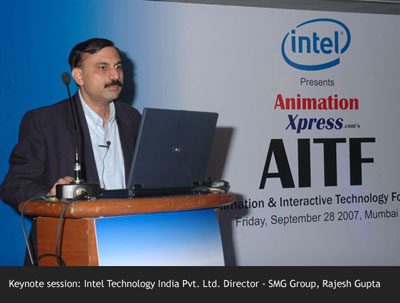 Beginning with the keynote by Rajesh Gupta (Intel Technology India Director – SMG Group) the audience got a wonderful glimpse into the direction that technology was taking and in particular, Intelâ€?s plans for catering to the animation and gaming industry’s needs. “The Animation industry is exploding with 20% year on year growth. We analyzed the animation studio scenario and based our developments on it. Rendering simple and complex scenes take 15 to 24 hours. Very complex scenes fail to render. People work whole night to wait for the scenes to be rendered completely. There is a constant demand for rendering speed. So, we are concentrating on developing the technology to overcome these obstacles. A major area of concentration is to lower the cost of rendering. So there is a technology pyramid we follow, grow the business, be more competitive and operate more effectively “
Beginning with the keynote by Rajesh Gupta (Intel Technology India Director – SMG Group) the audience got a wonderful glimpse into the direction that technology was taking and in particular, Intelâ€?s plans for catering to the animation and gaming industry’s needs. “The Animation industry is exploding with 20% year on year growth. We analyzed the animation studio scenario and based our developments on it. Rendering simple and complex scenes take 15 to 24 hours. Very complex scenes fail to render. People work whole night to wait for the scenes to be rendered completely. There is a constant demand for rendering speed. So, we are concentrating on developing the technology to overcome these obstacles. A major area of concentration is to lower the cost of rendering. So there is a technology pyramid we follow, grow the business, be more competitive and operate more effectively “
“We have introduced quad core processors for workstations to operate more effectively. Through quad core technology we take a next step forward. It gives robust high performance graphics, to do creative designing. Threaded software helps in scalability of workflow and increases effectiveness and lets you create and render concurrently three scenes” he added, pointing out that Intel was going to engage with the animation industry a great lot in the coming years.
Hollywood Ahoy!
“With Indian animation and VFX studios working on Hollywood and International projects, the technical knowledge and skills transfer is happening at a rapid pace and the same experience will be very useful as India makes its own animated features and games” shared Indian VFX ambassador to Hollywood N Madhusudhanan who was up next.
“One has to have very clearly defined pipelines. There are several processes that go into creating 3D Animation and VFX, studios should first specialize in any one of those processes and then pitch for that particular work to Hollywood studios”
Madhusudhanan also shared that within couple of years nearly every major Animation & VFX studio in the world, would have some sort of working relation with India.
Another interesting trend he pointed out about was related to Digital Stereoscopy which was being embraced by Hollywood. “In near future around 2700 cinemas will be converted for stereoscopic firms and that means again a lot of technical work will be outsourced” he added.
Madhu Sudhanan also shared news that the Visual Effects Society of which he was the Indian representative, is coming to India for a six city tour and would be interacting with a lot of Indian studios and artists to take the collaboration and knowledge transfer between Hollywood and Indian studios further. “There will be a lot of action and interactivity around the VES tour” he said, adding that ” AnimationXpress.com is the Indian media and communications partner”
Imbibing the technology sensibility
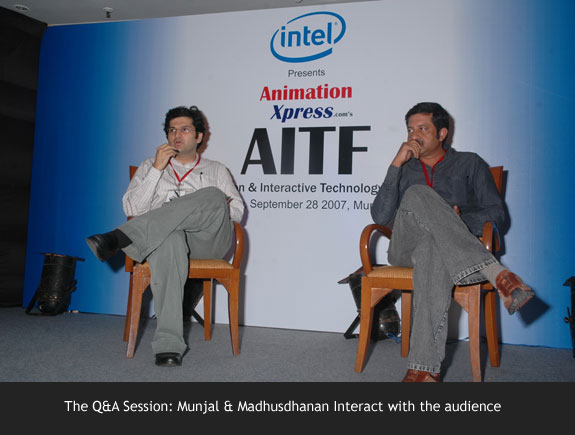 Munjal Shroff, COO & Director of Graphiti Multimedia who is an Engineer by qualification shared that “While story telling and creativity are the USP of any creative digital content, it is technology that helps deliver great creative products on schedule and within budgets”
Munjal Shroff, COO & Director of Graphiti Multimedia who is an Engineer by qualification shared that “While story telling and creativity are the USP of any creative digital content, it is technology that helps deliver great creative products on schedule and within budgets”
Citing from Graphitiâ€?s experience, Munjal shared about the time when they were a 12-15 member studio only and were working on the genie character in Khul Ja Sim Sim. “When we began we were given 30 seconds of animation being produced in a week, it was so much liked by the audience that the screen time for genie was increased to 3 minutes. Good news for us but the production became a night mare and it is in times of scaling up our output that one realizes a lot of loop holes in the system and gets to modify things in real time”
The perennial paradox with technology is that today�s latest becomes obsolete in a couple of years. The solution lies not in just investing money recklessly in the latest technology products but to imbibe an analytical and logical technology sensibility that takes into account several factors related to budgets, deadlines and quality benchmarks before taking any technology decision.
These factors are unique to each studio and to each project and have to be dealt with after careful analysis. But for any big studio it is very important to have the right centralized storage, rendering systems and processes in place.
Open Source & Proprietary Software
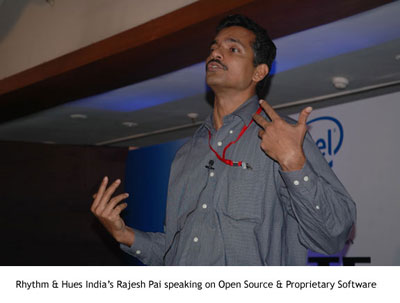 All the world’s large studios have big R&D teams that develop a lot of in house proprietary software. Speaking on the subject of Open Source and Proprietary Software, R&H India Technology Head Rajesh Pai shared, “Building your own software is a long term strategy. You have to be aware of what you want to do. One way is to throw money and the other is to understand the problem. For any studio that wants to be in full control of its destiny, it is a must to have an R&D team and develop its own tools and software. This makes one more confident of meeting commitments”
All the world’s large studios have big R&D teams that develop a lot of in house proprietary software. Speaking on the subject of Open Source and Proprietary Software, R&H India Technology Head Rajesh Pai shared, “Building your own software is a long term strategy. You have to be aware of what you want to do. One way is to throw money and the other is to understand the problem. For any studio that wants to be in full control of its destiny, it is a must to have an R&D team and develop its own tools and software. This makes one more confident of meeting commitments”
Also when studios are started there is a specific investment budget on which the business model is based, but quite a lot of additional costs are not factored in, such as buying upgrades to software for every single seat, year upon year.
And then there are the specific needs of your projects, that you anyways need to develop tools and plug-ins for, even if you are using generic off the shelf software.
Keeping all these aspects in mind, it makes a lot of sense to set up R&D teams right from the word go and to keep on developing and innovating.
Pai spoke about the production tracking systems that included a virtual file system that was aware of each asset in every job, job trackers that were built using Java and tracked every issue in every job and media reference library that was seamlessly shared between both LA & Mumbai.
Another Point made by Pai was that technical students in India need to be made aware of Animation & Games as a career opportunity. “This field is more challenging, it is more creative and the growth path for a technical professional is quick and satisfying” he added.
Game! Tech! Match!
Mumbai based Trine Studios is amongst the most striking game development studios in the country with 3-4 titles being developed concurrently including the game “Streets of Mumbai”
Ovidui Lupas, Game Programming lead from Trine gave a very passionate and comprehensive presentation on several issues related to game development at AnimationXpress.com�s AITF. The underlying theme was that developers need to make use of the collective knowledge base and technology available in the market rather than spending time and resources in re-inventing the wheel.
“Of course there are pros and cons to licensing technology as well as developing in house” pointed out Ovi.
“Buying Game Engines from the market always give you the best looking games” he shared, “It is always best to use existing engines and purchase them. There are game engines available for every budget. On the other hand, game engines are licensed out on a per game basis hence itâ€?s not feasible for a studio that develops games frequently or is into creating decks of small games. Also the other positive point about creating oneâ€?s own engine is that the bugs can be sorted out in house and one does not have to depend on external support to sort out the problems.”
He also spoke about issues like Physics, Multi Thread Gaming and the future of game development.
According to him physics are not always needed and should be used for specific things. If the moves of a game are predictable then a lot of physics is not required. There are physics that affect and don�t affect the game play. He spoke about different physic engines and their possibilities.
“The one message I have for all game developers is to actively indulge in online forums and discussions, “Thatâ€?s where a lot of solutions to bottlenecks are found and thatâ€?s where the collective experience and knowledge base of this field resides,” he concluded.
Art driving Technology?
Nikhil Nagda, cO Founder r& Creative Director, ettaminA studios
RK Chand, Consultant, ettaminA studios It is not the case of Art or Technology, but rather a scenario of Art & Technology. Both compliment each other.
Technology has to change rapidly because of the demand of art. If we look at input devices, all tools have been created because of the requirement of the artists for a better workflow
And Art is created, perceived and even treasured because of technology. Elaborated Nikhil, “Now artists have the option of creating art digitally, layer by layer. Hence, if changes have to be made, the entire drawing doesnâ€?t have to be re-done. In a scenario where changes would have been required to be made, a few years ago, the artist would have had to re-draw the entire thing. With the new technology, one can convert ideas into more things.”
A very interesting point the duo made was “The fact is that there is actually not that much of a difference. They both need investigation, involve ideas, theories and hypothesis. Most importantly, what connects the two is that they both are two spheres where hands and minds come together. Also, like scientists, artists study too.”
Developing Pipelines for CG Features
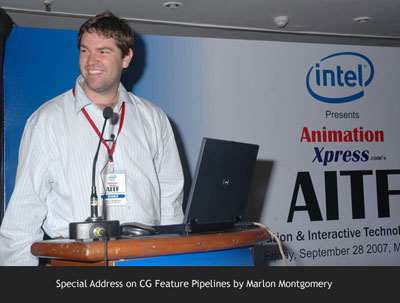 The theme of Marlon�s Montgomery�s presentation was the importance of introducing processes and planning in the DNA of the technology pipeline.
The theme of Marlon�s Montgomery�s presentation was the importance of introducing processes and planning in the DNA of the technology pipeline.
“Good infrastructure, processes and planning are of paramount importance, whether the studio is big or small. Once you have a proper process, then any investment you make, will pay for it in the first one or two projects” he said.
Marlon shared that a lot of cost and time could be saved by putting into practice simple procedures such as naming conventions and file saving nomenclature.
An ideal pipeline is a set of processes, integrated with hardware and software, enhanced with self developed or 3rd party plugins includes risk management systems and is customized to specific goals. They are reliable, efficient, quick and easy to scale up.
He elaborated on systems for Production Navigation Systems, “production navigation system provides all users the ability to traverse the large directory structure required for an animated feature efficiently. ”
Highlighting the usage of Asset Management and its requirement, Marlon elaborated, “CG feature film production involves huge amounts of data and most shots need things that are also present in other shots and at the same time many things that appear in the shots are similar to one another. So we should manage our asset in such a manner that we can use our data in a way that it can be collected whenever it is required so we can make our work easier.”
“I am really impressed with Indian studiosâ€? resourcefulness and innovative capability and they do a lot with very little, but imagine how much more can be achieved if processes and efficiency come in play” he concluded.
Click here for slideshow
AnimationXpress.com Technology Wheel of Honor
As an organization, AnimationXpress.com realizes the importance of every professional in every link in the value chain and technology is not just a link but literally the backbone of the animation and gaming production process.
Respecting and acknowledging the contribution of technology professionals in the animation & gaming field, AnimationXpress.com initiated the AnimationXpress.com Technology Wheel of Honor which was conferred upon four outstanding professionals including
– Krishna Prasad (KP) who besides being presented the wheel of honor , was also specially felicitated for his contribution of putting India on the Animation technology map
the AnimationXpress.com Technology wheel of honor was also conferred upon
– Rajesh Pai, for his technology contribution at R&H India,
– Jesh Krishna Murthy for creating a special real time 3D visualization software Anibrain RT,
– Kushal Shah of JayKushal Exports for educating and advising consumers on the best technology options and helping them save costs
Expert Panel Discussion Critical Issues in Technology decisions
“Indian studios need to become pragmatic and realistic in their approach to technology. Often times, huge investments are made into technology without proper tests as to how useful and suited they would be for particular projects. Solutions and pipelines have to be tried out in real world production ready environments and issues and bottlenecks should be addressed well before the investment is made and the technology implemented” shared Jai.
Added Jesh Krishna Murthy, “Entrepreneurs, studios, production professionals need to remove the mind block they have to things like Programming and coding. Being open to applying these to oneâ€?s workflow helps reduce redundancy and smoothens the processâ€?
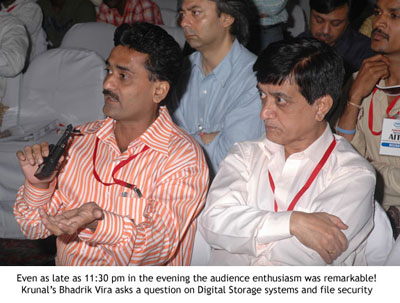 Krishna Prasad spoke about issues things like Consolidation and how the latest need not be the best. “Resource management and proper utilization of your technology needs is extremely important and many a times, an organization is under utilizing its resources or wasting it due to lack of a proper management system. Technology is always an enabler, but there has to be proper management of it too” he said.
Krishna Prasad spoke about issues things like Consolidation and how the latest need not be the best. “Resource management and proper utilization of your technology needs is extremely important and many a times, an organization is under utilizing its resources or wasting it due to lack of a proper management system. Technology is always an enabler, but there has to be proper management of it too” he said.
Vivek Malhotra from FX Graphics shared on the importance of reliable storage systems and asset management software. “It is extremely important for studios big and small to invest into asset management systems and proper centralized storage. Your investment would pay for itself within six to eight months” he shared
Intelâ€?s Rajesh Gupta, pointed out “Technology is no longer just about clocking higher speeds but there are several aspects that need to be looked into when one invests in technology. Amongst these is energy efficiency which is very importantâ€?
The discussions continued, defying the ticking of the clock
Concluding the session AnimationXpress.comâ€?s Anand Gurnani gave his viewpoint “From where I see it, even technology is art”
The 1st AITF got over amidst great response, but this is only the start………